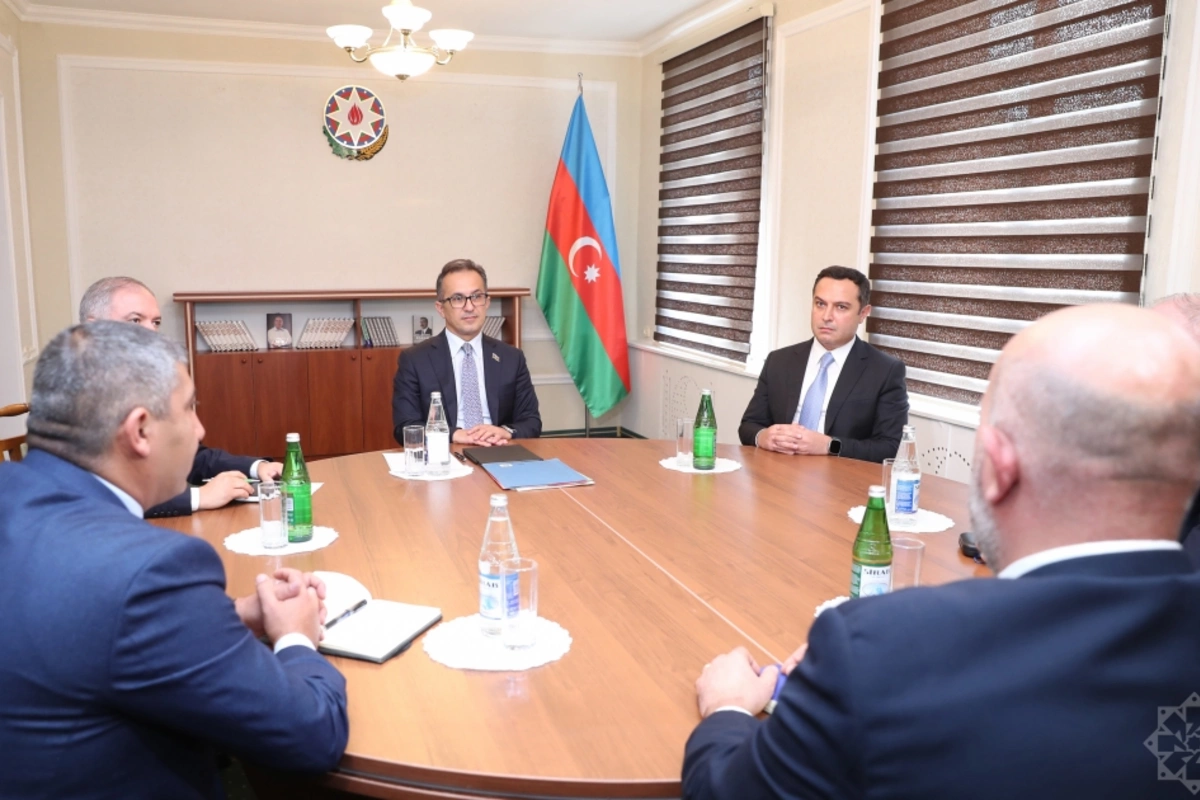
Talks have taken place in Yevlakh between Azerbaijan and representatives of Karabakh's Armenian population involving military disarmament and regional integration.
Image: azertag.az
Following the 20 September agreement mediated by the Russian peacekeeping contingent in Karabakh, talks have taken place in Yevlakh between Azerbaijan’s delegation and representatives of the region’s ethnic Armenian population. They came a day after Baku said a military operation to disarm and dissolve separatist ethnic Armenian units had achieved its aims.
Talks between the sides are not new, but previous meetings held in March in Khojaly broke down after Karabakh’s representatives refused to discuss the region’s reintegration into Azerbaijan. They also rejected offers to meet in Baku and Yevlakh, citing security concerns and again refusing to discuss integration.
This time, however, geographically, and politically isolated, as well as militarily defeated, Karabakh had little choice but to agree. For Baku, the talks were essential given that separatist forces, it says, posed a threat to the return of Azerbaijani Internally Displaced Persons (IDPs) from the early 1990s to their former homes, now being rebuilt in the seven surrounding regions.
At the time of writing, as part of the agreements reached, the Russian Ministry of Defence says that the Karabakh Armenians have already handed over 6 armored vehicles, more than 800 guns, and around 5,000 rounds of ammunition to its peacekeeping contingent.
As was the case earlier this year, the Azerbaijani delegation for last week’s talks was headed by Karabakh-born Milli Majis (National Assembly) MP Ramin Mammadov while Davit Melkumyan, a politician, and Sergey Martirosyan from the de facto Karabakh authority’s “Security Council” represented the Karabakh Armenians. Rear Admiral Oleg Semyonov, co-head of the Russian-Turkish Joint Monitoring Center in Aghdam, also participated.
From what is known so far, the full disarmament and dissolution of Armenian units, in addition to Baku’s plans to reintegrate the local population, were discussed. No final agreement was reached on the second point, but Baku considered the talks productive enough to lead to an agreement. The supply of electricity to Karabakh also resumed the following weekend, apparently from Azerbaijan’s power grid.
With the issue of Karabakh now possibly separated from the process of Armenia-Azerbaijan normalization, this could mean that both tracks can proceed with few hindrances. A main obstacle in negotiations between Baku and Yerevan until now had been the latter’s insistence on including an international mechanism on the rights and security for the Karabakh Armenians.
“Azerbaijan’s agenda is about regional peace, and Azerbaijan will do its utmost to assure reintegration of the residents of Karabakh,” presidential advisor Hikmet Hajiyev said at a briefing for diplomats last week. The same day, Armenian Prime Minister Nikol Pashinyan also said that he believed there was currently “no direct threat” to the ethnic Armenian population, criticizing calls to evacuate them.
Despite this, concerns persist among many Armenians, especially in Karabakh, where the situation is said to be dire. However, Hajiyev reassured diplomats in Baku that “Azerbaijan’s vision is ready” and that there would be “a smooth reintegration process.” He also promised to “meet the immediate humanitarian requirements of the population on the ground.”
The following day, aid consisting of flour, bread, oil, sugar powder, tea, candies, pasta, vermicelli, bulgur, rice, diapers, toothbrushes, and soap was sent to Karabakh from Azerbaijan via Aghdam. Additionally, on 24 September, 65 and 150 tons of flour were transported via the Lachin checkpoint by the Russian peacekeeping contingent and the International Committee of the Red Cross (ICRC), respectively.
Nonetheless, France also tabled an emergency session of the United Nations Security Council on 21 September to discuss the humanitarian situation in Karabakh. The meeting was critical of Azerbaijan’s use of force but welcomed the resumption of talks between Baku and the Karabakh Armenians.
Even so, Baku has its own concerns, believing that some external actors continue to disrupt efforts to resolve the conflict. “Some international media outlets engaged in a massive disinformation and misinformation campaign,” Hajiyev said.
Elchin Amirbayov, Presidential Representative for Special Assignments, echoed these concerns, urging “certain countries to think twice before taking any steps, actions, or statements that could put this fragile situation into further jeopardy.”
Such concerns are valid, with many Karabakh residents now facing the daunting task of having to decide whether to stay or leave for Armenia. That might ultimately depend on the outcome of the talks, which, analysts warn, will not be easy. For three decades, Azerbaijanis and Karabakh’s Armenians have lived in almost complete isolation. Memories of the early 1990s, 2016, and 2020 wars linger in the consciousness of both, and the latest fighting has only revived them.
Indeed, on 24 September, Karabakh announced that some residents can now be evacuated if they swish. As these were ethnic Armenians displaced during last week’s fighting, many are likely to do so. The Azerbaijani Ministry of Defence also announced that demobilized soldiers from Armenia’s own armed forces will be repatriated via Lachin and Kelbajar.
Meanwhile, while talks over Karabakh continue, Yerevan and Baku say they remain committed to the normalization of relations.
On 26 September, Armenian Security Council Secretary Armen Grigoryan will meet with Hikmet Hajiyev in Brussels. Also in attendance will be the advisors to French President Emmanuel Macron, German Chancellor Olaf Scholz, and European Council President Charles Michel. The meeting is to prepare for five-way talks involving Aliyev and Pashinyan on the sidelines of the European Political Summit (EPC) in Granada, Spain, on 5 October.
Share on social media